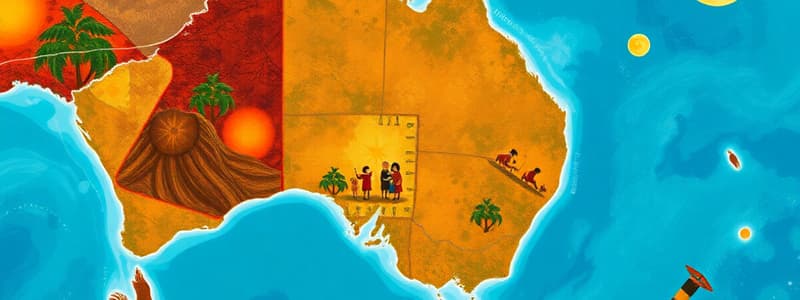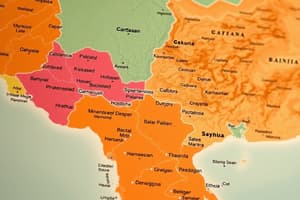Podcast
Questions and Answers
What is significant about the remains found at Kow Swamp?
What is significant about the remains found at Kow Swamp?
- They are the oldest remains in Australia.
- They were found near a freshwater lake.
- They are the only remains of Aboriginal people.
- They demonstrated differences between ancient and recent Aboriginal peoples. (correct)
The remains found at Lake Mungo support that the area has been occupied for at least _____ years.
The remains found at Lake Mungo support that the area has been occupied for at least _____ years.
47,000
Match the following findings with their significance:
Match the following findings with their significance:
Kow Swamp remains = Includes the skeletons of men, women, and children Mungo Man = Claimed different DNA lineage WLH 4 = Reconstructed mitochondrial genome Cohuna skull = Reflects characteristics of cranial deformation
Why is the DNA from ‘Mungo Man’ considered controversial?
Why is the DNA from ‘Mungo Man’ considered controversial?
Ancient DNA typically lasts for over 30,000 years in Australian conditions.
Ancient DNA typically lasts for over 30,000 years in Australian conditions.
What significant event separated Australia from New Guinea?
What significant event separated Australia from New Guinea?
The earliest Australians are believed to have had a common ancestry with Indigenous peoples of New Guinea.
The earliest Australians are believed to have had a common ancestry with Indigenous peoples of New Guinea.
To navigate to Australia, the earliest travelers likely used _____ made of bamboo.
To navigate to Australia, the earliest travelers likely used _____ made of bamboo.
The first evidence of human occupation in Australia comes from sites in the Northern Territory.
The first evidence of human occupation in Australia comes from sites in the Northern Territory.
Match the migration patterns with their descriptions:
Match the migration patterns with their descriptions:
What is the currently accepted age of the Madjedbebe rock shelter?
What is the currently accepted age of the Madjedbebe rock shelter?
The oldest human fossil remains found in Australia are dated to around 60,000 years ago.
The oldest human fossil remains found in Australia are dated to around 60,000 years ago.
The site of Moyjil in Warrnambool offers evidence dated to __________ years ago, but definitive proof of human occupation is lacking.
The site of Moyjil in Warrnambool offers evidence dated to __________ years ago, but definitive proof of human occupation is lacking.
Match the archaeological sites to their significance:
Match the archaeological sites to their significance:
What role does ochre play in Aboriginal culture?
What role does ochre play in Aboriginal culture?
What is one of the forms that archaeological evidence of living sites has taken?
What is one of the forms that archaeological evidence of living sites has taken?
Rock art in Aboriginal culture has survived in the archaeological record for over __________ years.
Rock art in Aboriginal culture has survived in the archaeological record for over __________ years.
Which material is NOT commonly associated with the making of stone tools in Australia?
Which material is NOT commonly associated with the making of stone tools in Australia?
The remains of shell middens can be used to gain insight into ancient Aboriginal diets.
The remains of shell middens can be used to gain insight into ancient Aboriginal diets.
What was a likely use of rock art among early Australians?
What was a likely use of rock art among early Australians?
Flashcards are hidden until you start studying
Study Notes
Migration and Geography
- An ocean has traditionally separated Asia and Australia, but early travelers had to navigate across vast waters.
- Australia was once connected to New Guinea as part of a landmass called Sahul, separated by rising sea levels about 8,000 years ago.
- Indigenous peoples from Australia and New Guinea are closely related, indicating recent common ancestry.
Changing Sea Levels
- Sea levels have significantly influenced migration patterns and geography in South-east Asia and Australia.
- During low sea levels, the distance for migration from Timor to Sahul was approximately 90 kilometers.
- Sea levels fluctuate due to Ice Ages, when water is stored in polar ice caps, versus warmer climates, leading to ice melt.
Early Settlement of Australia
- The arrival of the first Australians marks a major seafaring achievement.
- It's unclear whether the settlement was a deliberate act or accidental due to environmental factors.
- Evidence such as ancient boats is lacking; it is suggested that rafts, possibly made of bamboo, were utilized.
Archaeological Evidence of Occupation
- Human occupation in Australia dates back to around 50,000 years ago, particularly noted at the Madjedbebe rock shelter.
- Recent claims of occupation dating back 120,000 years at Moyjil remain unproven, with ongoing investigations.
- By 30,000 years ago, all parts of Australia, including arid regions and Tasmania, were inhabited.
Culture and Human Remains
- Archaeological findings mainly include stone tools, rock art, ochre, and shell middens, revealing the complexity of Aboriginal culture.
- The oldest human fossils in Australia are about 40,000 years old, indicating a varied physical appearance of early inhabitants.
Technological Advances in Tools
- Stone tool technology evolved over time, with early tools still in use, and new specialized tools emerging around 6,000 years ago.
- Ground stone tools appeared 10,000 years earlier in Australia than in Europe, suggesting advanced techniques among early Australians.
Significance of Rock Art
- Aboriginal rock art has existed for over 30,000 years, comparable to famous European cave art sites.
- Its role likely intertwines with cultural rituals, although its precise purpose remains uncertain.
Use of Mineral Pigments
- Ochre and other pigments are the oldest evidence of art from the initial human settlement, around 50,000 years ago.
- These natural pigments were likely used for cave painting, burials, body art, and more, reflecting continuous cultural practices.
Evidence of Living Sites
- Diverse archaeological remains indicate various lifestyle practices, reflecting adaptations to different climates and environments.
- Shell middens are critical for understanding ancient diets and can be radiocarbon dated to ascertain site ages.
Important Archaeological Sites
- Coobool Creek: Excavated remains of 126 individuals dating from 9,000 to 13,000 years ago, notable for large physical size and cranial deformation practices.
- Kow Swamp: Burial site dated between 9,500 to 14,000 years ago, showcasing significant skeletal differences from contemporary Aboriginal people.
- Lake Mungo: The oldest human remains in Australia, occupied for at least 47,000 years, supported by advanced dating methods.
Controversial Genetic Findings
- In 2001, claims emerged regarding distinct mitochondrial DNA from 'Mungo Man,' suggesting different ancestry from modern humans, though later studies could not replicate these findings.
- Results indicate that ancient DNA often becomes contaminated and is rarely preserved beyond 30,000 years in Australian conditions.
Studying That Suits You
Use AI to generate personalized quizzes and flashcards to suit your learning preferences.




